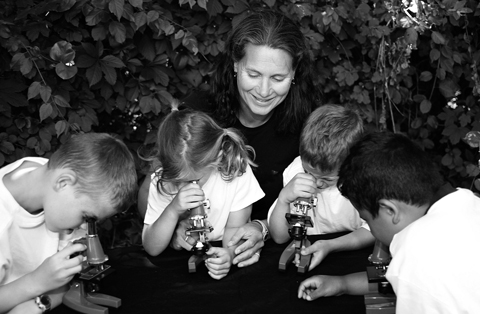When asked what inspired her to create The Young Scientists Club series of do-them-at-home science kits, Esther Novis ’87, A.L.M. ’94, shies away from citing her degrees in biology, her year in medical school, or her experience as a teacher. Instead, she credits her five kids. “I’m able to combine being a mother with my love for teaching,” she says of the kits—36 in all—geared toward encouraging children between the ages of five and 12 to pursue their curiosity about the natural world. Besides offering children and their elders a hands-on introduction to scientific concepts, devising projects that go beyond the traditional baking-soda-and-vinegar volcano has had benefits for Novis as well.

Photograph by Paula Larimer
Esther Novis with some young collaborators at her Young Scientists Club summer camp
As a mother tired of electronic toys for young children and unimpressed by the elementary-science programs in local schools, Novis wanted to provide something more challenging for her family and to keep up her own science connections as well. She found the available science books and kits primarily aimed at older children, especially boys, and thus inappropriate for the younger audience they were supposedly targeting. “These books were telling kids they had to memorize the periodic table to understand science,” she recounts, laughing. “But you don’t need that in second grade.” Unable to find what she wanted, she decided to produce it herself.
Explorations with her own children had convinced Novis that kids need to be introduced to science in a creative way—something she wishes more science teachers were skilled at. Familiarizing children with science while they’re young is crucial, she says: “By the time you hit middle school, you’ve lost a lot of kids” who’ve never had that “hands-on approach.” She also stresses continuity in scientific experience, to help children retain what they learn. That philosophy informs the design of her kits: children build a compass while studying magnets, for example, and then use that compass, along with the weather vane built with the next kit, to study wind direction.
The Young Scientists Club (www.theyoungscientistsclub.com) began at home as a summer science camp for her five-year-old son. She invited friends’ children over to share in simple science experiments—“anything from exploding volcanoes and digging out real fossils to flying rockets and making slime,” she says. When out-of-town friends who heard of the project wanted to join in, Novis began developing her science kits. Besides making sure the instructions were easy for all ages to follow, she took care to include the correct amount of any materials not readily found at home, so “parents don’t have to buy three pounds of plaster when you need only a cup!”
What began as projects mailed to friends in plain white envelopes has developed into a subscription service that she reports reaches thousands of children worldwide and has earned the National Parenting Seal of Approval and Teacher’s Choice Award for its products. The company also makes custom kits for retailers and schools; this year Novis has released new kits affiliated with the popular Magic School Bus children’s books.
She looks to her original inspiration for cues for the company’s future development. “Kids who attended the camp when I first started it come and help out now,” she explains. “When I’m designing a new kit, I like to see what kids at the camp like, and I work from there.”
~Emma Lind





